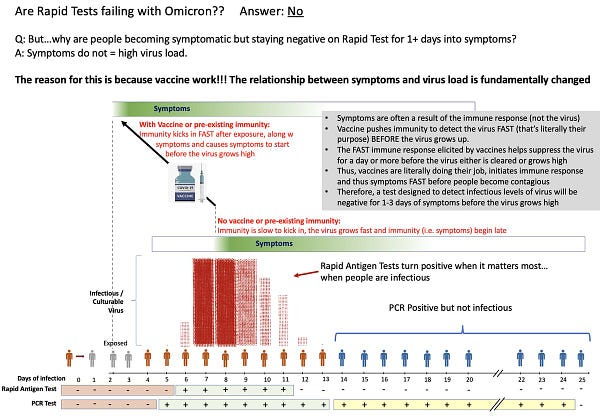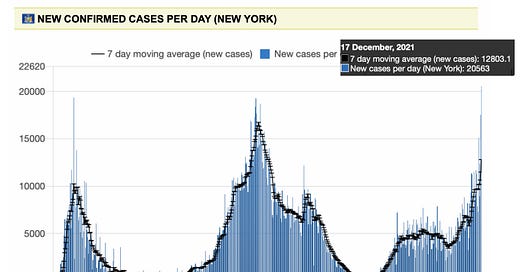The Omicron update I didn't want to write
Well, I think it’s safe to say that Omicron sucks.
We’re hitting records all over the world in terms of positive test results, and I’m sure by now you’ve seen panicked headlines about case numbers and heard anecdotal reports of breakthrough infection after breakthrough infection.
The speed with which Omicron numbers are going up is staggering and shows no signs of slowing down.
I’ve been getting more texts, emails, and questions over the past couple of days than at any time since the first COVID wave hit our shores in the Spring of 2020.
So it seemed like the right time to talk a bit about what I’m reading and seeing to try to make sense of what feels like a very chaotic situation.
We’re still a bit early on to know a lot of information definitively, but here’s a reminder about the framework to think about when it comes to how worried we should be:
Transmissibility: How easily does this virus spread?
Immune evasion: How well does current immunity - either acquired through prior infection or through vaccination - hold up?
Illness severity: Does Omicron cause us to get more sick or less sick than prior variants?
As always, you can reply to this email with questions or comments, which I welcome from all of my readers.
Just how contagious is Omicron?
It’s insanely contagious.
Look at how many countries are hitting records for case numbers. The curves you’re seeing reflect exponential rise and a ton of community spread. That means you’re going to see numbers going up quite a bit before you see them coming down.
The degree of spread that we’re seeing may be a reflection of the way that Omicron impacts our tissues differently than previous strains.
It appears that Omicron grows way more efficiently in the upper airway than prior strains.
You may have seen the headline about Omicron replicating 70 times faster in the upper airway than Delta did. It comes from this graphic released by a team at the University of Hong Kong:
Omicron grows insanely rapidly in the upper airway in the first 24 hours (that’s a log scale on the vertical axis), which means a lot of viral particles get made.
As a result, Omicron is probably quite a bit more inherently contagious than other strains. Some estimates suggests 2-3x more contagious, although the confidence interval for that estimate is quite wide.
More spread in the upper airway may make spread easier, but a lot of what we care about in terms of disease severity has to deal with the lower airway (AKA the lungs), which we’ll talk about in a minute.
Do prior infections and prior vaccinations still protect us?
It seems that the answer is yes, although it’s a little early to draw definitive conclusions. Call it a ‘probably yes’ rather than a ‘definitely yes.’
There’s emerging evidence to suggest that Omicron is leading to a lot of re-infections and breakthrough infections, causing a lot of chatter about the efficacy of vaccines.
I think it’s safe to say a couple of things here:
The vaccines appear to be really, really effective in reducing the risk of severe disease, hospitalization, and death. Even with Omicron.
Immunity after vaccination seems to wane after around 6 months, with a large inter-individual variation.
Boosters seem to at least restore that waning immunity, and probably produce a greater degree of immunity than the standard vaccine series ever did. In fact, there’s significant debate about whether the initial vaccine series should have been spaced out more to provide a greater degree of initial immunity.
Immunity is more complicated than just looking at antibody titers in a lab. That means you can’t draw major conclusions about any study that tells you about antibody levels.
The preliminary things that we’re seeing about Omicron raise alarm that it causes more breakthrough and re-infections than the prior strains, although how much of that is waning immunity isn’t clear.
There’s reason to be optimistic about illness severity
Let’s temper our optimism first. Every population and every healthcare system are different, and you can’t just look at other countries and extrapolate.
And we won’t know about this for some time - remember, there’s a lag of a few weeks between when people get infected and when people get really sick.
And with exponential growth, the vast majority of cases are the most recent ones, which means that many millions more will be infected by the time we understand the answer to the severity question.
But, there is reason to have some cautious optimism on an individual level.
Based on some of the preliminary data we’re seeing, it’s possible that even though Omicron spreads incredibly quickly and evades a lot of our immunity that it may actually cause less severe because it doesn’t enter into cells in the lower airway - the lungs - as efficiently as other strains did. And it doesn’t seem to multiply in the lungs as quickly as other strains either.
Unfortunately, the optimism about illness severity for individuals doesn’t extend to a population level.
Even if Omicron is way less severe than prior strains, the exponential rise in case numbers may mean that even if a smaller percentage of folks get really sick, that the total number of cases can still lead to overwhelmed hospitals across the country.
This will almost certainly be worse in areas with lower rates of vaccination and boosting.
It’s really scary to look at the graphs of rising cases over the past week.
The human mind isn’t well equipped to deal with exponential rise, but I will say that I’m more considerably more concerned about Omicron than I ever was about Delta.
So what can you do about it?
Worth spending a couple of sentences on a number of different strategies here.
Vaccines
Well, the vaccines are safe and effective, so get vaccinated if you haven’t.
If you were vaccinated more than 6 months ago, a booster makes sense. For a lot of people, it makes sense even if you were vaccinated more recently. If you were originally vaccinated with the Johnson and Johnson vaccine, an mRNA vaccine booster is a no-brainer in my eyes.
Masks
Over the past few months, I’ve been getting more and more on the anti-mask train since the data have been so unimpressive (and I find masks so onerous to wear).
But I think that Omicron changes things.
With so much spread, more cautious mask wearing is probably smart.
Even if the data suggest masks aren’t that great, I’m still changing my behavior. In a time of crazy spread, it’s hard for me to ignore the common sense aspect of it - the virus is spread by our spit and secretions, so covering our faces should decrease spread.
Surgical masks are way better than cloth masks. I think it’s a big enough difference to recommend buying some surgical masks if you don’t have any.
And N95s are better than surgical masks.
Handwashing and deep cleaning
Handwashing is always a good idea, but it’s not uniquely stopping COVID.
Cleaning surfaces is good too, but the idea that it prevents COVID is theater at this point. You don’t need to spray down boxes or avoid touching things at the grocery store.
COVID isn’t spread by fomites, and there’s nothing to suggest Omicron is any different here.
Remember: testing is the way out of quarantine and into normalcy
It’s a real travesty that tests are still so expensive and hard to come by. It’s embarrassing that so many at-home tests approved in Europe aren’t available here because they haven’t been approved.
I’m appalled that it cost me $25 for two rapid tests the other day and that people are waiting for hours in lines all over New York City to get tested.
Tests should be fast, cheap (or free), and available everywhere.
The original sin of our pandemic response was “slow down the testing, please” and we still haven’t fixed it.
I think it’s worth saying bluntly: if you’re having symptoms, you should get tested. But unfortunately, a negative test doesn’t mean that you’re in the clear.
It’s worth reading this thread from Michael Mina in full, where he explains why a negative test doesn’t mean that you’re not infected, but it likely does mean that you’re not contagious:


So in summary: Omicron sucks, and I wish I were writing about almost anything else.
The next couple of months may be COVID heavy, and I think it’s worth recognizing the concerns raised from what the most up to data are telling us.
If Omicron doesn’t take an abrupt and unexpected turn for the better, you can expect more to come on treatments and drugs in the coming weeks here.
Stay safe!
Thank you for reading! Please share with friends and family and encourage them to sign up!
I welcome any questions and comments that you have. Stay safe!





